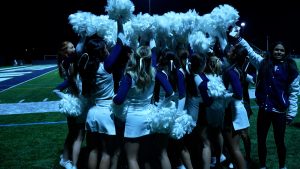Award shows becoming more politicized
Oscars going to cap off another political awards show season
February 22, 2017
This award season, Hollywood hasn’t shied away from being a part of the political conversation as actresses and musicians use both their screen time and speeches to speak out against the current political landscape.
It all started with Meryl Streep’s Golden Globes speech on Jan 8. She began by speaking of the great diversity in Hollywood, specifically the variety of where people in the audience came from and who they end up playing.
Continuing, Streep noted the specific time when President Donald Trump mocked a reporter with disabilities. She mentions her struggle to comprehend the event and the fact that it wasn’t a movie, but real life.
Shocked by Donald Trump’s complete lack of respect and compassion, Streep shared her worries for its influence in the future.
“And this instinct to humiliate, when it’s modeled by someone in the public platform, by someone powerful, it filters down into everybody’s life, because it kinda gives permission for other people to do the same thing. Disrespect invites disrespect, violence incites violence. And when the powerful use their position to bully others we all lose,” Streep said.
Further, Streep acknowledged the need for the press and the privilege of her position as an actress to speak out against the issues within the United States. It was at this moment, Hollywood took note.
The political-driven speeches didn’t stop with Streep, they had only begun.
However, the political nature of Streep’s speech wasn’t solely met with support. Many criticized her for speaking about politics, believing it wasn’t an actress’s place to do so.
A week later at the Screen Actors Guild Awards, Kerry Washington quickly refuted this assumption with her acceptance speech: “But the truth is, actors are activists no matter what, because we embody the worth and humanity of all people.”
The SAG Awards occurred during Trump’s recent immigration ban. Ashton Kutcher spoke specifically of its influence as he opened the show.
After greeting viewers, he also took time to greet those who were currently waiting to be allowed in:“And everyone in airports that belong to my America. You are a part of the fabric of who we are, and we love you, and we welcome you.”
While all of these politically-fired, liberal-leaning speeches were received completely in praise and applause, there was one that clearly surpassed the rest.
David Harbour, Police Chief Jim Hopper from “Stranger Things,” delivered his winning speech after the show won Best Ensemble. Riled up in passion, Harbour spoke of repelling bullies and sheltering freaks and outcasts. He shared his personal feelings of the duties of actors and actresses as they recreate life.
“And through our art to battle against fear, self-centeredness and exclusivity of our predominantly narcissistic culture and through our craft to cultivate a more empathetic and understanding society by revealing intimate truths that serve as a forceful reminder to folks that when they feel broken and afraid and tired they are not alone,” Harbour said.
The entire audience stood up in applause, nodding heads in passion-induced support. The room was on fire, preaching acceptance and justice. The typical speech of thanking producers and directors was dead, in its place was political fervor and resistance.
As the Grammys fast approached, audiences were wondering how musicians would react to the recent election via their music and speeches.
After many performances lacking political substance, Katy Perry sang her new song “Chained to the Rhythm” with Skip Marley. On the shoulder of her all-white suit, “PERSIST.” A clear reference to the recent feminist rally phrase coined by Senate Majority Leader Mitch McConnell to Sen. Elizabeth Warren “Nevertheless, she persisted.”
While the song itself was intensely political, the background of the stage, after imitating the shattering of the bubble, pieced itself back together with the preamble of the Constitution, specifically “We the People.” Perry left the stage with one final remark, hand in hand with Marley, “No hate!” Perry said.
“We The People” became a recurring theme as A Tribe Called Quest performed their recent single off of their politically-charged album.
With Anderson Paak, Consequence and Busta Rhymes in full support, the group began their tribute for Phife Dawg, while simultaneously shutting down Trump’s agenda.
Busta Rhymes saluted Trump as “President Agent Orange.” At the chorus of the song in which A Tribe Called Quest speaks out against the hate towards minorities, the same minorities that were being sung about, joined A Tribe Called Quest on stage.
The song finished as everyone on stage stood with a black power salute and one last word, “Resist.”
The show ended soon after, audiences in awe of the not-subtle political outcries.
With the Oscars this coming Sunday, audiences can only wonder what political messages will be made.













































